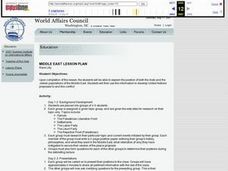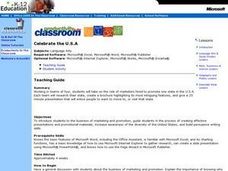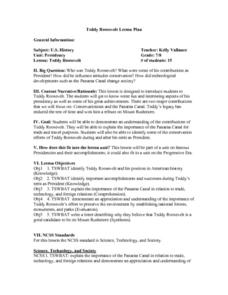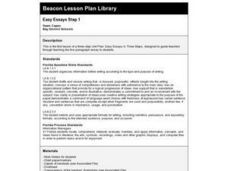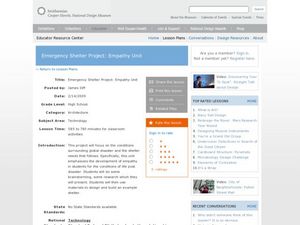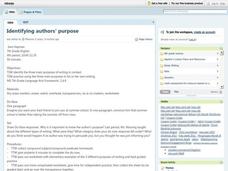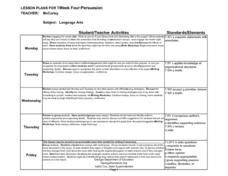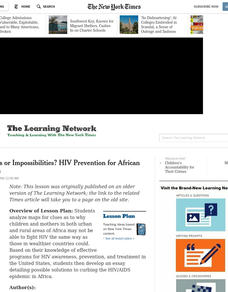Curated OER
Retain or Abandon, Adapt or Convert: The Immigrant's Dilemma
Students examine the problems and options facing immigrants and formulate a position paper. It is based on their reading and their familiarity with immigration issues in the United States.
Curated OER
Does Global Warming Increase the Intensity of Atmospheric Natural Disasters?
Students study global warming by communicating the problem, process and solutions. In this global lesson students use graphs, research and write a critical stance on natural disasters.
Curated OER
Middle East Lesson Plan
Students explain the position of both the Arab and the Jewish populations of the Middle East. They use this information to develop United Nations proposals to end this conflict.
Curated OER
Social Studies - Guessing Game
Focus on a particular geographic location with this resource. Learners use their social studies textbook to look up information about a specific place. They write down a list of facts and read them to the class. Classmates guess which...
Curated OER
The Outsiders: Anticipation Guide
The Outsiders by S.E. Hinton is always a favorite for middle and high school readers because it addresses issues that hit home to them, decades after the book is set. Have learners fill out an anticipation guide that encourages them to...
Curated OER
Celebrate the U.S.A
Young scholars, working in teams of four, take on the role of marketers hired to promote one state in the U.S.A. Each team researches their state in order to create a brochure highlighting its most intriguing features. Groups give a 25...
Curated OER
Teddy Roosevelt
Students examine the life, contributions, and influence of Teddy Roosevelt. They view a slideshow lecture and take notes on a handout, filling in the blanks on the handout. Students then write a persuasive letter to a governmental...
Curated OER
Immigration
Eighth graders examine the American immigration experience. In this immigration lesson plan, 8th graders watch a video about Ellis Island and discuss the processing that took place there. Students write letters in the voice of American...
Curated OER
Emergency Shelter Project: Empathy Unit
Pupils design emergency shelters. In this designing emergency shelters lesson, students discuss living conditions of people after a natural disaster. Pupils discuss the tsunami that struck East Asia. Students design collapsible...
Curated OER
The future of Affirmative Action
Eleventh graders explore the term Affirmative Action. In this US History instructional activity, 11th graders create a presentation that will determine the future of federal affirmative action programs. Students write a speech that...
Curated OER
Getting our Paws into the Cause
Twelfth graders examine local, state, and/or national animal welfare organization. In this Social Studies lesson, 12th graders research their identified organization. Students develop a planned intervention strategy to help persuade...
EngageNY
Forming a Research-Based Claim: Comparing Cascading Consequences
It's time to weigh the risks and benefits of screen time! Pupils work in triads to identify the strongest positive and negative consequences from their Cascading Consequences chart. Next, using the chart and their researcher's notebooks,...
EngageNY
Choosing a Position: Screen Time and Adolescents
Time to pick a side! Building on the Fishbowl activity from the previous instructional activity, scholars choose a position about whether the American Academy of Pediatrics should raise its screen time recommendations. Using notes,...
Curated OER
Identifying Issues facing Africa
Students identify 5 issues facing Africa as a class The work in teams to create a joint project, conduct independent research into Africa, and present these ideas in a persuasive argument. The work in their groups in class to plan their...
Curated OER
Critical Thinking About Government
Students research the Comox Band's system of government and report on what kind of government they think would work for them. In this government lesson plan, students decide between a hereditary system or an election system of...
Curated OER
Identifying author's purpose
Why is it important to know an author's purpose? After reviewing the three main purposes of writing, seventh graders write a persuasive letter to convince why summer school is better than taking the summer off. They can then join in a...
Curated OER
Language Arts: Persuasion
Students examine the characteristics of persuasive writing. They identify arguments, supporting details, and discuss how to reorganize and present information in more effective ways. Students compose their own essays and discuss their...
Curated OER
A History of Conflict Resolution and the Jury System
Students study the history of the jury system in the United States. They enact a number of different types of trials including trial by jury. They complete a worksheet that compares the trials systems before writing a persuasive essay...
Curated OER
Plants for Pleasure and Profit
Young scholars study about some of the specimens collected or diagrammed by Lewis and Clark, discuss their usefulness, and rank their importance. They write a persuasive essay detailing the plants they thought the most important.
Creative Educator
Sell It with Propaganda
Augment a unit on propaganda by prompting class members to create propaganda. Using Frames software, groups demonstrate their understanding of propaganda techniques by designing a new product, creating a commercial to sell their product,...
Curated OER
Emission Statement
Students investigate the emission of greenhouse gases by industrialized nations. They present their findings in a simulated international global warming conference. They then whether or not the United States should take part in the...
Curated OER
Solutions or Impossibilities? HIV Prevention for African Children
Students analyze maps for clues as to why students and mothers in both urban and rural areas of Africa may not fight HIV the same way as those in wealthier countries. They write an essay outlining solutions to the AIDS epidemic.
Curated OER
Trying Teens
Students explore the court cases and legal organizations that were instrumental in creating a system of juvenile justice in the United States, then present their findings in a composite timeline.




